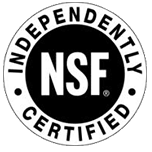The importance of NSF Certification
There are important reasons to look for NSF Certification when purchasing a water filter:
- Performance claims may be based on internal testing only.
Do you have access to all
the testing procedures used? Was
testing done to industry standards?
- Sometimes stated capacities are misleading
because they may be based on only chemical (chlorine) reduction and don’t take particulates into consideration. Particulates have an important role in how long a filter will last. Most often, a filter plugs from dirt before the chemical capacity is used up.
- In capacity claims, it’s not always clear what percentage of chemical contaminants are actually reduced.
For example, if there is only a 50% reduction in chlorine then higher capacities can be claimed. But is removal of only half the chlorine acceptable for quality beverages?
NSF Certification ensures that:
- The contaminant reduction claims certified are true and accurate.
- The materials of construction do not add anything unwanted to the water such as lead.
- The system is structurally sound.
- Advertising claims are true and accurate.
What is NSF?
- Founded in 1944, NSF International is a not-for-profit organization that provides public health and safety risk management solutions to companies, governments and consumers around the world.
- Its main business is to bring together experts in public health, manufacturing, and sanitation from government, industry, academia and the public to develop and adminster performance standards for products which have some impact on sanitation and public health.
- NSF maintains state-of-the-art laboratories where products can be tested according to set standards.
For water filters, look for these certifications:*
- NSF/ANSI Standard 42: Aesthetic Effects
For water treatment systems designed to reduce specific aesthetic or non-health-related contaminants (chlorine, taste and odor, and particulates).
- NSF/ANSI Standard 53: Health Effects
For water treatment systems designed to reduce specific health-related contaminants, such as Cryptosporidium, Giardia, lead, volatile organic chemicals (VOCs),
MTBE (methyl tertiary-butyl ether).

